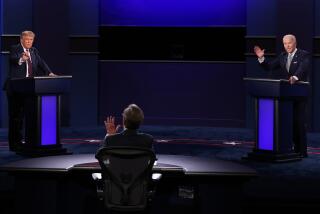In Brian Williams’ case, will Americans forgive and forget?
When it comes to the honesty demanded of public figures, Americans appear to be a fickle bunch.
Former President Clinton is once again a widely admired leader, despite infamous prevarications regarding his relationship with Monica Lewinsky. In contrast, cyclist Lance Armstrong is regarded as a pariah for his years of lying about his use of performance-enhancing drugs.
James Frey was publicly shamed by Oprah Winfrey for fabricating much of his memoir, “A Million Little Pieces,” but went on to write a bestselling, critically acclaimed novel, “Bright Shiny Morning,” and even to receive an apology from Winfrey. Former New York congressman and mayoral candidate Anthony Weiner, meanwhile, remains a national laughingstock nearly four years after he was first caught lying about his sexting habits.
For an embattled personality like Brian Williams, it can seem as if there’s no guaranteed path to redemption. Last week the NBC News anchor was suspended from his job for six months without pay after it was discovered that he had told inaccurate tales about coming under enemy fire while aboard a military helicopter in Iraq in 2003.
The fall from grace has been precipitous: Only two months ago, Williams marked 10 years as anchor of “NBC Nightly News” by signing a contract worth a reported $10 million a year. Now, according to one recent poll, 40% of Americans view Williams as untrustworthy.
Luckily for Williams, there is a rough logic to why some high-profile liars are forgiven and others are not.
“We regard lying as having very different moral weight depending on what our expectations are of the person involved, depending on the motives for the lie, and depending on the consequences of the lie,” said Edward Wasserman, dean of the Graduate School of Journalism at UC Berkeley. “All of these things have important bearing on how much moral weight and how much condemnation we bring to the liar.”
The closest parallels to Williams’ predicament can be found in politics, where candidates are especially prone to the sort of self-aggrandizing personal narrative that got Williams into trouble. Think of Sen. Marco Rubio, who claimed his parents had fled Fidel Castro’s regime in Cuba when, in fact, they arrived in the United States more than two years before Castro took power. He is now considered a front-runner for the Republican presidential nomination in 2016.
Or consider that other famous Clinton, Hillary, who claimed in a 2008 campaign speech that she had landed in Bosnia under sniper fire in 1996. When videotape surfaced showing the then-first lady calmly greeting well-wishers on the tarmac, Clinton quickly apologized for “misremembering” the incident.
Unlike Williams, she suffered little long-term damage from the tall tale, which she laughed off in an appearance on “The Tonight Show.” In the wake of Williams’ suspension, some conservative pundits have already begun reminding voters of the incident.
So how to explain the divergent reactions to uncannily similar situations? It’s a matter of expectations, says Ian Leslie, author of “Born Liars: Why We Can’t Live Without Deceit.”
“We expect our politicians to present a theatrical version of themselves,” he said. “If you’re invested in [someone] as a truthful, noble person, you’ll be shocked and angry when they lie. People don’t think of politicians that way, for better or for worse. We don’t have that kind of emotional investment in them being 100% truthful.”
Americans may be cynical about journalism, but not so much so that they’re willing to allow reporters to exaggerate wildly, as Williams did — consciously or not.
Within the Fourth Estate, the Williams case is “a weird different kind of animal,” says Robert Drechsel, the director of the Center for Journalism Ethics at the University of Wisconsin.
Unlike well-known fabulists Stephen Glass, Jayson Blair or Janet Cooke, Williams does not seem to have made up entire stories from whole cloth. Nor is there much evidence to suggest that Williams is a habitual embellisher, though an NBC internal investigation is continuing and questions have also arisen about his reports from New Orleans following Hurricane Katrina in 2005.
The nearest match in the world of journalism may be fellow network anchor Dan Rather, who was famously ousted from CBS after a report about President George W. Bush’s military record that relied in part on suspect documents. He might have been duped, Dreschel says, “ but it’s not like [Rather] was out there making up stuff about himself.”
Here’s where the questions of motive and intent figure prominently into the redemptive calculus. Armstrong will probably never recover because he lied repeatedly and for such obviously self-serving reasons; Bill Clinton lied in an attempt to save his own hide. Not an honorable thing to do but more understandable than building an entire athletic empire based on a deception.
Unlike with Clinton or Armstrong, it’s not clear that Williams was being consciously deceitful. Leslie notes how Williams’ story gradually shifted over the years, his role in the narrative becoming more central in each retelling. “I think it’s a case of somebody who’s told a story so many times and wants it to be a certain way, so that he’s changed the story in his own mind,” Leslie said. “His sin is egotism, not deceptiveness.”
His motive, though, is more problematic: It’s hard to believe Williams would have gotten carried away with this story if it didn’t make him look like a hero. His misrecollection hints at a love of the limelight that’s unseemly for a serious journalist. Williams has long since blurred the line between journalist and celebrity, with a media profile that goes well beyond his nightly anchor duties. He has hosted “Saturday Night Live,” slow-jammed the news with Jimmy Fallon, guest starred as himself on “30 Rock” numerous times and accompanied his daughter, Allison Williams, at red carpet events for her HBO show, ‘“Girls.”
Leslie also argues that the arena in which Williams told the most fantastic version of his story — David Letterman’s couch — only encouraged embroidery. “He has this audience who are the opposite of skeptical who are all saying, ‘Wow, that’s extraordinary! You must have been so terrified.’”
In corporate America — not generally considered a bastion of righteous behavior — inflating one’s professional accomplishments as Williams appears to have done can have dire repercussions. RadioShack’s David Edmondson and Yahoo’s Scott Thompson are both chief executives who lost their lofty jobs after it was revealed they’d fudged their academic records.
The newsroom should be no different than the boardroom, argues Eric Orts, a professor of legal studies and business ethics at the Wharton School at the University of Pennsylvania. And the fact that Williams, who was not alone in the helicopter, repeatedly misrepresented the incident for more than a decade with impunity hints at a larger problem within the network’s corporate culture.
“Did they just think, well, this is cool, he’s building his reputation?” Orts asked. “So what if it’s an embellishment, he’s on Letterman, he’s building our ratings to No. 1, so we’re just going to look the other way?”
Williams’ claim that he “misremembered” the initial helicopter incident drew widespread ridicule on Twitter, but perhaps it shouldn’t have. Robert S. Feldman has spent decades studying lies and deception as a professor of psychological and brain sciences at the University of Massachusetts Amherst. His research has found that that the average person lies two to three times within 10 minutes of meeting someone else — generally telling the sort of “white lies” we consider not only socially acceptable but necessary, lest we appear rude.
Feldman says that false memories are actually more common and less nefarious than we like to think. Most of us, for instance, think we had better high-school grades than we actually did.
“We all tend to remember the past in a rosier light,” he said.
While it’s unlikely Williams will ever look back on this chapter in his career in a rosy light, he may at least be able to put it behind him, Feldman said. “The American people are hugely forgiving.”
More to Read
The complete guide to home viewing
Get Screen Gab for everything about the TV shows and streaming movies everyone’s talking about.
You may occasionally receive promotional content from the Los Angeles Times.






